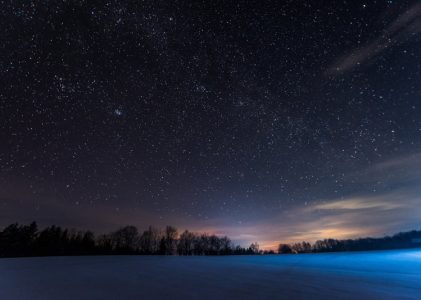In this article published by the NASW (National Association of Social Workers) Massachusetts Chapter’s Social Work Voice newsletter, Katrina Shepard explains the connection between light pollution and mental health, and details some of the efforts to combat this problem right here in Massachusetts. Check out the original PDF here.
Perhaps unexpectedly, the intersections of environmental policy, mental health, and social justice are alive and well, in the realm of dark sky conservation. We see this connection specifically among those fighting light pollution, which impacts our psychological health, local wildlife, and much more. Light pollution, especially blue light at night, is linked to increased rates of cancer, obesity, depression, diabetes, and disrupted sleep. Here in Massachusetts, Senate and House bills S2147 and H3306 aim to minimize these negative effects. The “Act to improve outdoor lighting, conserve energy, and increase dark-sky visibility” has 31 bi-partisan co-sponsors, and over 1600 people have signed a petition on Change.org, at the time of this writing.
Despite the widespread assumption that more light is better, decades of research have proven that such an assumption is misguided, and detrimental to our health. This idea of “more light = safety” has led to higher levels of outdoor lighting, which is linked to poor health outcomes. Boston primarily utilizes (often stockpiled) LEDs, for cheap, bright light, in what is called Acorn lighting- part of the city’s Safe Street retrofits- when it should be following Cambridge’s lead. Many outdoor lighting fixtures there have less glare, and decrease output after 10 p.m.
Why should social workers care about this issue? First, a recent study published in JAMA Psychiatry found that adolescents who live in areas with high levels of outdoor artificial light at night get less sleep, and are more likely to have a mood disorder than teens who live with low levels of outdoor light. This particular study found that teens in cities with higher levels of outdoor light were more likely to have a mood/anxiety disorder, and more likely The Right Light to be diagnosed with bipolar disorder. It also found racial and socio-economic disparities. Teens from immigrant or minority groups who live in lower income families are more likely to live in areas with high levels of outdoor light at night. This is significant particularly during a global pandemic. Challenges related to Covid-19 have exacerbated mental health issues, and with more people spending time at home, backyard environments deserve our attention.
An Act to improve outdoor lighting, conserve energy, and increase dark-sky visibility will establish best practices for state or municipally-funded light projects, and require MA Department of Transportation (Mass DOT) to study roadway lighting practices—potentially leading to a reduction in carbon emissions. Please check to see if your legislators have signed on to support these bills and, if not, contact them right away. If contacting their offices by email, be sure to include the reasons that this legislation is needed.
Our planet’s daily cycle of light and dark is important to sea turtles, birds, fireflies, and all of humanity; yet, access to a clear night sky has been steadily disappearing. Indeed, it is estimated that 80% of Americans cannot see the Milky Way, and millions of children will never experience it. In addition to supporting bills S2147 and H3306, Massachusetts residents can join their local chapter of the International DarkSky Association, to advocate for their own health and clearer skies. Future generations deserve to enjoy the same awe that many of us have felt, and still feel, looking up at what Anne Morrow Lindbergh once called “a bowl of stars.” As social workers, we are certainly experts at finding beauty and value in the dark.

